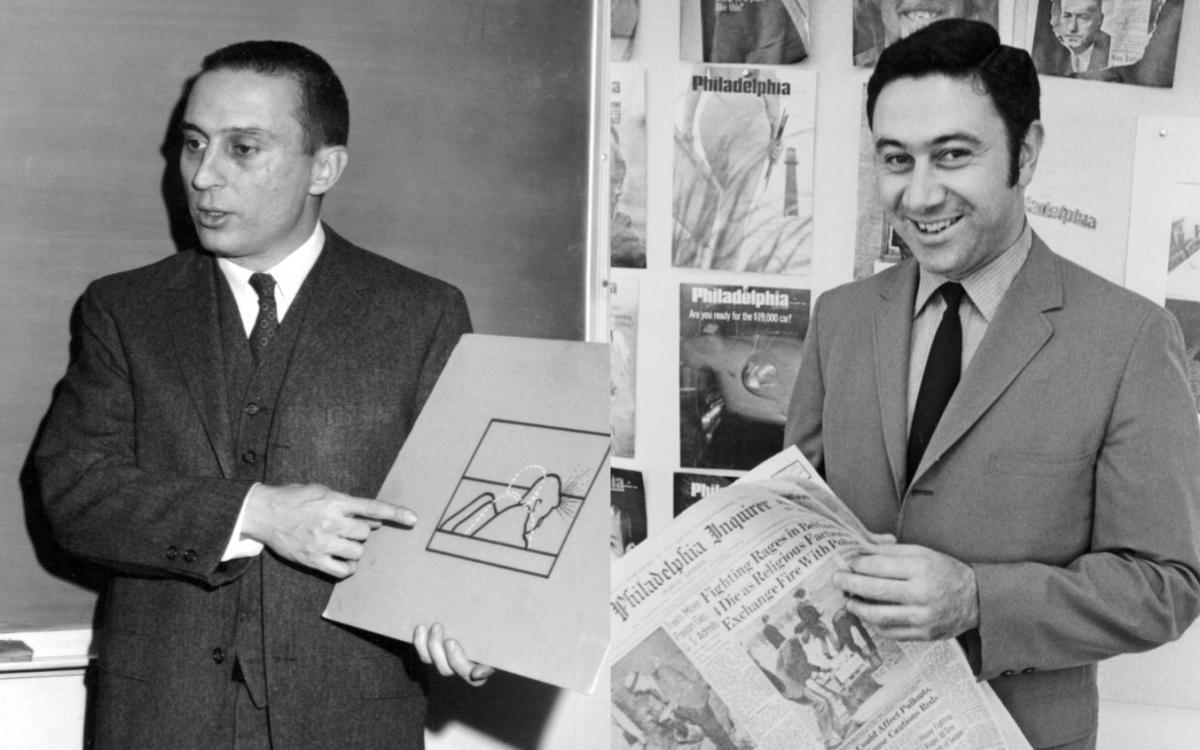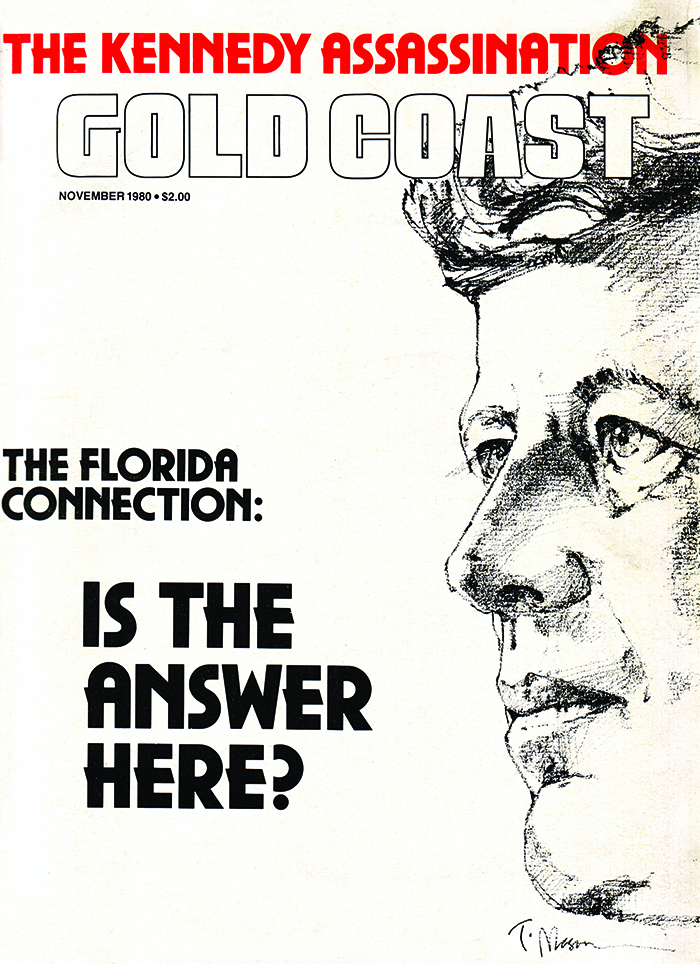JFK Assassination - the Saga Lives On
The 57th anniversary of the assassination of President John F. Kennedy passed quietly last week, all but forgotten amid the health crisis and election turmoil gripping the nation. This year, however, was not without events important to the ongoing mystery of JFK's death. Two men died to whom that death was not such a great mystery. They pretty much knew who did it, and why. And both had connections to our former Gold Coast Magazine.

One of them, Vince Salandria, a Philadelphia lawyer and former teacher, died in August at the age of 92. He spent much of that long life convincing people that the official Warren Commission conclusion, that Lee Harvey Oswald had acted alone, was absurd. In fact, it was a carefully planned campaign to cover up the conspiracy between the CIA and other government leaders, including the military, to remove a troublesome president.
Among the first people he convinced was this writer, and our former magazine partner, Gaeton Fonzi. It happened in a motel in Wildwood, N.J. in the summer of 1966. Fonzi and I were working for Philadelphia magazine and were teamed up on a light story about Wildwood, a popular summer vacation spot for Philadelphia's blue collar set. Fonzi had read a piece by Salandria in a legal newspaper, in which Salandria questioned the Warren Commission's conclusion about Oswald and particularly the role of Arlen Specter, who was running for D.A. in Philadelphia. Specter had gained national attention as the inventor of "the magic bullet" theory, which held that a single bullet caused wounds to both Kennedy and Texas Governor John Connally, and somehow wound up in pristine condition on a hospital stretcher. One bullet doing so much damage was crucial to the case of a lone gunman. Fonzi had contacted Salandria, and the latter was so anxious to talk that he drove down to Wildwood the next weekend. We had developed an interest in the case, so Fonzi suggested we sit in. He warned that Salandria might be crazy.
And at first, that's what we thought. Salandria was a thin, gaunt-faced man with an almost unnerving intensity. He seemed like a fanatic. But over the next hour, he went through the evidence so methodically that we were both convinced that on an analysis of JFK's wounds alone, the Warren Commission was wrong. Furthermore, Salandria alleged the investigation had been rigged, and he knew by whom.
"Don't you see it boys, don't you see it," he said, "There's only one outfit who could have pulled this off." He meant the CIA, and if Fonzi had any doubt about that, it was dispelled in a follow-up interview with Arlen Specter.
Despite his key role, Specter had faced no hard questions about his "magic bullet" theory. He had not expected Fonzi to be so prepared to ask them, and he fumbled all over the place trying to explain his theory. Fonzi's subsequent article and other follow-up pieces in Philadelphia magazine created quite a local stir. Nobody knew it at the time, but one magazine reader who was impressed was Richard Schweiker, soon to be elected to the U.S. Senate. For purposes of this narrative, Vince Salandria makes an exit, but over the next 50 years, he grew to iconic stature, influencing the growing number of JFK conspiracy researchers. And he had laid the groundwork for what follows.
Fast forward nearly a decade. Richard Schweiker, now a U.S. Senator, was co-chairman of a committee looking into CIA abuses, including its role in the Kennedy investigation. By then it had been discovered that Chief Justice Earl Warren had had little to do with the investigation that bore his name, and it had been controlled by elements associated with the CIA. Schweiker was convinced Lee Harvey Oswald was much more than the official Warren Commission version of a lone gunman. "He has the fingerprints of intelligence all over him," Schweiker said.
He told that to Gaeton Fonzi, who he had hired as a special investigator in 1975. He remembered Fonzi's Philadelphia magazine articles and contacted him when he learned Fonzi was now in Florida, a place Schweiker suspected could prove fertile ground for research. He especially wanted to probe anti-Castro Cuban sources because Oswald had been portrayed as a Communist Castro supporter, even though he seemed to have links to CIA sources in New Orleans.
We were able to give Fonzi some help getting started, introducing him to Martin Casey, who grew up on the same block in Philadelphia. Marty had been in the Marine Corps before moving to Florida, marrying a Cuban woman and becoming fluent in Spanish. Seeking adventure, he was active in training anti-Castro Cuban-Americans and took part in some daring activities. He was trusted by the Cuban community. He was also one of the few who knew that Fonzi was working on the Kennedy assassination. Most people Fonzi interviewed thought he was part of another highly publicized probe of more recent CIA misdeeds. Many Cubans resented President Kennedy for abandoning the CIA-sponsored invasion of Cuba, which ended disastrously. They might be reluctant to cooperate.
Fonzi credited Marty with connecting him to some of the most important anti-Castro fighters. One was Antonio Veciana who had led Alpha 66, the most important group trying to kill Castro. Veciana revealed his long association with his mysterious CIA handler who used the name Maurice Bishop. Then, not knowing at the time what Fonzi was up to, stunned Fonzi by casually mentioning that he had seen Bishop with Oswald in Dallas shortly before the assassination.
It was a brief sighting. Oswald was leaving when Veciana showed up for a scheduled meeting in a bank lobby. They were not introduced, but he recognized Oswald when he saw his photos after the killing. It would have been obviously dangerous for Veciana to reveal that at the time of the assassination. Besides, his goal was to eliminate Castro, not solve a president's murder. Also, he admitted to Fonzi, people who killed a president would not have qualms about silencing him. But now, 13 years later, he helped Fonzi by working with a police artist for a sketch of Maurice Bishop. It was accurate enough that Senator Schweiker himself recognized it as David Atlee Phillips, a high ranking CIA officer who had appeared before a Senate committee.
Thus began a chain of events which has evolved over five decades. They could make a book; eventually, in fact, they did. The investigation Fonzi worked on went nowhere. Political figures close to the CIA sabotaged the House Select Committee on Assassinations. The first general counsel, a highly respected prosecutor from Philadelphia (another Philly connection) was forced out when he insisted on keeping the CIA one of his targets. Senator Schweiker, Fonzi's patron, was no longer on the committee, which was now dominated by conservative legislators friendly to the intelligence community. Several congressmen pushed to cut its funding and demanded a fast conclusion. The original counsel's replacement was an organized crime expert who did not believe the CIA would lie about such an important matter. He wanted to pin blame on the Mafia. Fonzi wasted time checking leads on the latter and wrote most of the final report which said there had likely been a conspiracy but was inconclusive as to the identity of the assassins.
Fonzi was disgusted and wrote in effect a dissenting opinion to the report he had helped write. It first appeared in three long articles in Gold Coast Magazine in 1980. It also ran in Washingtonian magazine, a somewhat sensational form that got it sued by Phillips, the CIA man it associated with the crime. The magazine won after an expensive legal fight.

Fonzi continued with his research for years, and in 1993, those articles appeared in book form titled, "The Last Investigation." He revised the work in subsequent editions. It built an impact among other researchers who cited the book as a primary source. When Fonzi died in 2012, the New York Times, in a flattering obit, called it one of the best books on the assassination.
Antonio Veciana lived longer, until this past June. He was 91. As time separated him from his CIA days, he grew more candid. At the time he told Fonzi about Maurice Bishop, Veciana would not identify him publicly - even after they met face to face at a surprise confrontation Fonzi set up in Washington. But later in life, he said Maurice Bishop was indeed David Atlee Phillips. Fonzi knew that all along and had convinced thousands that the CIA engineered the assassination.
The title "The Last Investigation" reflected Fonzi's conviction that there would not be another serious government attempt to solve the murder. But thanks to his work, and the persistent research by Vince Salandria and courageous witnesses like Antonio Veciana, that may not be the case. Last year, a group organized to pressure Congress to take a fresh look at the JFK murder, along with those those of Robert Kennedy, Macolm X and Martin Luther King.
The members of this group relating to the Kennedy's cases is a virtual who's who of the Kennedy Assassination critics. Unlike the Warren Commission and the House committee Fonzi worked for, there is no danger of CIA infiltration. The Truth and Reconcilliation Committee will present the decades of compelling evidence to a new generation of Congress. Among the members are Hollywood names such as Oliver Stone, Rob Reiner, Martin Sheen and Alec Baldwin. G. Robert Blakey, the head of the committee Fonzi worked for, is there because he regrets that he trusted the CIA. Virtually every living writer who has contributed important research is among the group.
Most infuential may be the names Robert F. Kennedy Jr. and Kathleen Kennedy Townsend, Bobby Kennedy's children. Back in the 1960s, Bobby Kennedy and his brother Ted were largely silent on the subject of their brother's assassination, although it has been learned that Bobby Kennedy quietly followed the work of researchers and may have been waiting until he became president to reopen the investigation. Having Kennedys involved is meaningful.
It is too late to punish those who designed and perpetrated JFK's murder. They are all long gone. But it is not too late to correct a massive distortion of history.

Great article
This Comment had been Posted by George Mihaiu
Fascinating recounting of your experience with this subject over the years, Bernie...thanks for sharing it! Just watched a documentary about the days before, during and after the assassination. Very moving in how that period all came back so vividly to me watching it.